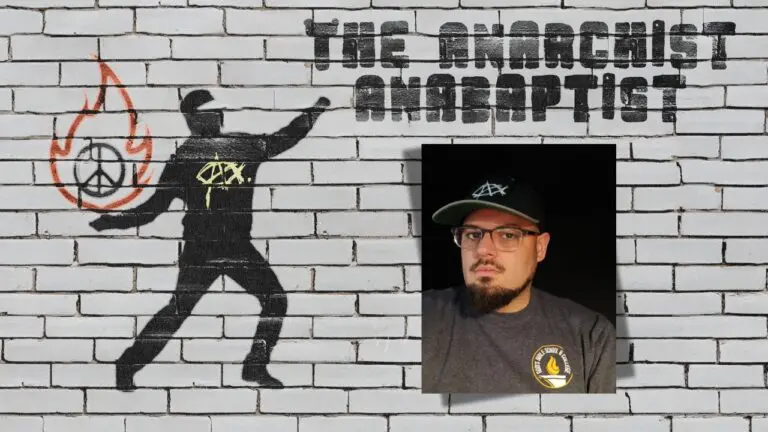
This article is adapted from my Foreword to Cody Cook’s latest book, The Anarchist Anabaptist. You can get your copy here.
I often give a lot of thought to the concept of compatibility. Whether in my work in using software in the business world or in advancing ideas in a nonprofit, compatibility is critical. When two components—or two ideas—aren’t compatible, they simply don’t function effectively together. If a proposed idea doesn’t align with someone’s existing worldview or values, it’s unlikely to gain traction.
At first glance, pairing libertarian or anarchist thought with Anabaptism might seem like trying to mix oil and water. One emphasizes individual freedom and limited interference, often celebrated in economic and political spheres. The other draws its strength from radical communal living and pacifism, rooted in a tradition of following the Way of Christ.
That’s why The Anarchist Anabaptist is so important. Cody Cook explores the idea that these two streams of thought are not only compatible but can actually enrich and sharpen each other when fully understood.
The key isn’t just basic compatibility. It’s about achieving what I like to call “maximum compatibility”—a level of alignment where the integration of two ideas produces something far more profound than either could achieve alone. This is what Cody invites us to discover as he examines how the seemingly disparate traditions of Anabaptism and libertarian anarchism can together offer a bold vision for living out Christian faith in a free and peaceful society.
What’s so compelling about The Anarchist Anabaptist is that it doesn’t just stop at demonstrating that these two traditions are compatible. Cody argues that, together, they present a fuller and richer vision for how Christians can live faithfully in a world often defined by coercion and conflict. Anabaptism brings a deeply rooted theological and communal perspective to the table, reminding us that our ultimate allegiance is to the Kingdom of God, not to any earthly power. Libertarian anarchism, on the other hand, provides a practical framework for how such a society could function in the here and now, emphasizing personal responsibility and voluntary cooperation.
Cody dives into the historical and philosophical roots of both traditions, showing that their convergence is not a recent or accidental phenomenon. From the early Anabaptists’ rejection of state power to the writings of thinkers like Leo Tolstoy and Jacques Ellul, the threads of anarchist thought have long been woven into the fabric of Christian nonviolence and voluntary faith.
In a world where political polarization often tempts Christians to align themselves with one power structure or another, Cody’s insights are a breath of fresh air. He challenges us to imagine a different kind of society—one where our interactions are governed not by force or fear but by love and mutual respect. This isn’t a utopian ideal; it’s a call to live out the radical teachings of Jesus in a way that’s both deeply practical and profoundly transformative.
We’re living in a time when many people are questioning the role of government and institutions in their lives. Some are drawn to the promises of more control and security offered by authoritarian regimes, while others seek refuge in tribalism and cultural gatekeeping. For Christians, this presents a unique challenge. How do we navigate our place in a society that increasingly views power as the ultimate solution to every problem?
The Anarchist Anabaptist offers a third way. It reminds us that the gospel calls us to a different kind of power—one that’s rooted in service, humility, and love. By drawing on both Anabaptist theology and libertarian principles, Cody paints a picture of a society where faith is freely chosen, communities are built on trust and cooperation, and justice is pursued without violence or coercion.
For libertarians, this book provides a valuable reminder that freedom isn’t just about individual rights; it’s also about building communities that reflect our highest values. For Anabaptists, it’s an invitation to rediscover their roots and consider how those roots can inform their engagement with contemporary issues of power, justice, and peace.
Once you purchase Cody’s book, I encourage you to approach it with an open mind. Whatever background you hail from, there’s much to learn from Cody’s exploration of these ideas. His writing challenges us to think deeply about the kind of world we want to live in and how our faith can help bring that world into being.

Articles posted on LCI represent a broad range of views from authors who identify as both Christian and libertarian. Of course, not everyone will agree with every article, and not every article represents an official position from LCI. Please direct any inquiries regarding the specifics of the article to the author.
Did you read this in a non-English version? We would be grateful for your feedback on our auto-translation software.
), //libertarianchristians.com/wp-content/plugins/smartquizbuilder/includes/images/template6-latest.jpeg))

), https://libertarianchristians.com/wp-content/plugins/smartquizbuilder/includes/images/template6-latest.jpeg))








































), https://libertarianchristians.com/wp-content/plugins/smartquizbuilder/includes/images/template6-latest.jpeg))
), https://libertarianchristians.com/wp-content/plugins/smartquizbuilder/includes/images/template6-latest.jpeg))
), https://libertarianchristians.com/wp-content/plugins/smartquizbuilder/includes/images/template6-latest.jpeg))





*by signing up, you also agree to get weekly updates to our newsletter
Sign up and receive updates any day we publish a new article or podcast episode!